January 18, 2024
Introducing CBE’s 2024−2025 ARC Fellow candidates
The College of Built Environments is pleased to introduce the candidates for the Applied Research Consortium (ARC) Fellowships in 2024−2024. During Feb−March 2024, these graduate students will explore opportunities to conduct applied research at our ARC member firms. ARC firm placements will be announced in late April, and projects will begin Autumn quarter, 2024. Read below for details about their diverse backgrounds and research interests.
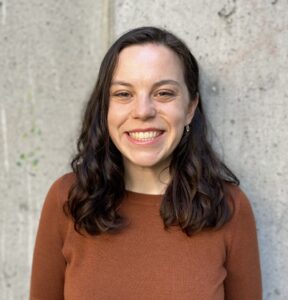
Ellie Anderson
Ellie Anderson is a Master of Landscape Architecture student. As a designer, she is interested in community-based participatory design for human health and wellbeing. She is particularly interested in using the principles of urbanism to design dementia villages, an alternative to traditional memory care centers. Her other interests include therapeutic design, healthcare settings, transportation, playscapes, place attachment, and community engagement.
As a graduate student, Ellie designed community engagement materials and recommended street tree locations and species for Seattle’s Safe Routes to School program. She also expanded plant recommendations for Seattle Green factor, a score-based code requirement that improves landscaping quality for new developments, and designed planting strips and a traffic island at the Seattle Department of Transportation’s Landscape Architect’s Office. Ellie also cleaned focus group data for the development of public health emergency preparedness toolkit at the UW School of Public Health’s Collaborative on Extreme Event Resilience.
Before studying landscape architecture, Ellie managed international HIV/AIDS, malaria, and health equity programs at the University of California, San Francisco Institute for Global Health Sciences. She holds a Bachelor of Science in Environmental Sciences and a certificate in African Studies from the University of Wisconsin-Madison.
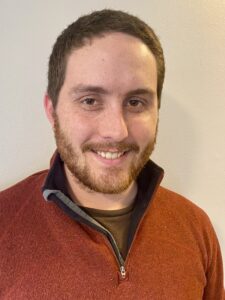
Nicholas de Vry
Nicholas de Vry (he/him) is a Built Environments PhD student with a background in archaeology, cultural resource management (CRM), and architectural preservation. He has worked in CRM as a field technician, report writer, and team lead, conducting archaeological testing and historic property surveys across the western half of Washington State. He is continuing to support the CRM firm ASM Affiliates while working on his studies.
Nick is interested in how history is valued and why we preserve old things. While earning his Master of Science in Architecture, History and Theory, at UW, he wrote about Seattle’s historic public school buildings and how the preservation process had impacted the communities associated with those schools. This touched on the ideas of public feelings of attachment and how minority peoples are treated by the preservation system. It also raised questions about whether preservation did what the regulations claim, and if there might be ways to improve preservation to be a more equitable and socially constructive process.
Through CRM work he has worked beside Tribal Nation representatives around Washington and he has perused classes in collaborative and Indigenous methodologies of archaeology. He hopes to continue to learn about and practice alternative methods in preservation.
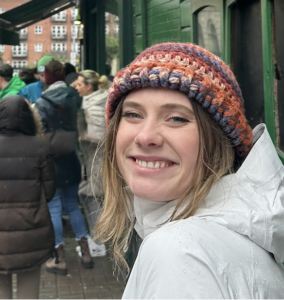
Evelyn Newman
Evelyn Newman (she/her) is a second-year student in the Master of Urban Planning and Public Health in Community-Oriented Public Health Practice (COPHP) concurrent degree program at the University of Washington. She received her Bachelor’s in Anthropology and Ethnic Studies from Lewis & Clark College. Throughout her four years of undergraduate research, Evelyn worked with different non-profit housing rights organizations. She saw firsthand displacement’s increasing role in urban planning and state policy priorities and how these processes affect the most marginalized communities. Partially in response, Evelyn then taught middle and elementary school education in urban settings, Minneapolis and Portland, and rurally, on the Northern Cheyenne Reservation in southeastern Montana. Given her personal and work experience, Evelyn opted to pursue an education in planning centered around the built environment’s impact on the social determinants of health.
Evelyn is currently working with International Living Future Institute in the research, reconsideration, and potential future developments in building design and health, specifically in best practices, the science around indoor air quality, thermal comfort, acoustics, daylighting, and more.
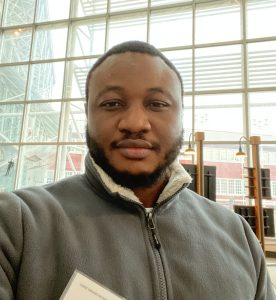
Idris Soliu
Idris Soliu is an international student from Nigeria, currently in his second year of the Built Environments PhD program. He received his Bachelor’s and Master’s degrees in Quantity Surveying and Construction Economics from the Federal University Technology, Minna, and the Federal University of Technology, Akure, respectively.
Idris has experience in both the construction industry and academics. He served as a consultant Quantity Surveyor/Estimator on projects that included residential, commercial, educational, mixed-use development, and hospital facilities. Additionally, he taught and conducted research for six years in the Department of Quantity Surveying, one of five departments in the Faculty of Environmental Sciences at the University of Ilorin, Nigeria. He was also a pre-doctoral instructor for three quarters in the Construction Management Department, University of Washington. He has co-authored 12 research publications.
During the summer of 2023, he gained practical experience through an internship with a Landscaping subcontractor, where his responsibilities included the preparation of estimates, requesting submittals from prime contractors, and submitting quotations.
Idris’ current PhD research focuses on the intersection of circular economy and digital technology, exploring the dual transition in the Built Environment. Specifically, he is interested in how emerging technologies such as digital twin, IoT, etc., can be leveraged to achieve Circular Built Environment. His other areas of interest include green building technology and project delivery methods in the construction industry.
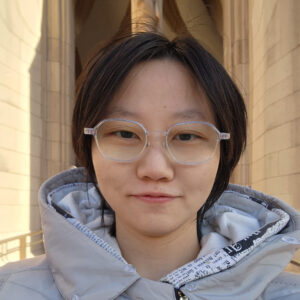
Eva Zhang
Eva Zhang (Jiafei Zhang in law) is a first-year student in the Master of Science in Architecture, Design Technology, degree program. Her academic background includes a Bachelor’s degree in architectural design with additional core coursework in computer science.
Zhang’s research interests relate to the integration of AI into the design realm, including AI for performance-driven design, data mining, and client preference-based design. She is currently studying in CBE’s Sustainable Intelligence Lab (SILAB) under the guidance of Professor Narjes Abbasabadi. Eva’s master’s thesis research next year will focus on the application of machine learning methods to the study of urban and human health correlations, trying to measure the role of specific features — such as the friendliness of the urban environment (e.g., walkability) — in human health. Another current research focus is client-preference-guided design, which improves design practice by data mining social media to extract the style and content preferences of various users.
Eva has completed an architecture internship at TJAD Original Design Studio in Shanghai, China, and a data analysis internship at Wuhan University, China. She is dedicated to the design-technology realm and is excited about this opportunity to work with a top design firm to push the boundaries further.
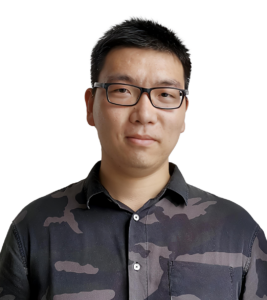
Yongqin Zhao
A designer, researcher, practitioner, and learner, Yongqin Zhao is a first-year Master of Science in Architecture, Design Technology, student at UW, intertwining landscape design, urban research, and cutting-edge technology. With a passion for leveraging AI in design workflow and urban data, Yongqin focuses on using modeling, representation, prediction, and management to cultivate performance-oriented and human-centered methodologies for industrial applications in built environment.
With a portfolio that spans design and consulting, Yongqin has made his mark in landscape and architectural projects at internationally recognized firms like Ramboll Studio Dreiseitl (now Henning Larsen) and Tianhua Urban Design Lab. In his recent internship as a data analyst at CityDNA Technology, Yongqin honed his skills in data analysis, visualization and product design, contributing to his proficiency in developing data pipelines and modeling, managing configurations, and crafting narratives through powerful visualizations. His thesis will be focusing on developing AI in urban data modeling, specifically, advancing urban digital twin with AI-equipped Agent based modeling, knowledge graph, and other promising technologies.
He brings to the field his skillful synthesis of research frameworks and workflow optimization, his adept handling of spatiotemporal data, and his analytical prowess in unearthing insights from complex urban and social data. Yongqin’s ability to design and optimize data for visualization platforms is demonstrated through his work on microservice, data dashboard layouts, and automated visualization configurations. His research on the built environment and urban mobility garnered attention at the CDRF academic conference, and continues to influence the field through his active research endeavors. He is also actively learning more technology development skills for his toolkit.
Yongqin holds a Master of Landscape Architecture degree from Louisiana State University and a Bachelor of Engineering from Nanjing Forestry University. An active contributor to the computational design and research community, Yongqin is continuously exploring innovative avenues to fuse design with cutting-edge technology, enhancing built environments and experiences.
